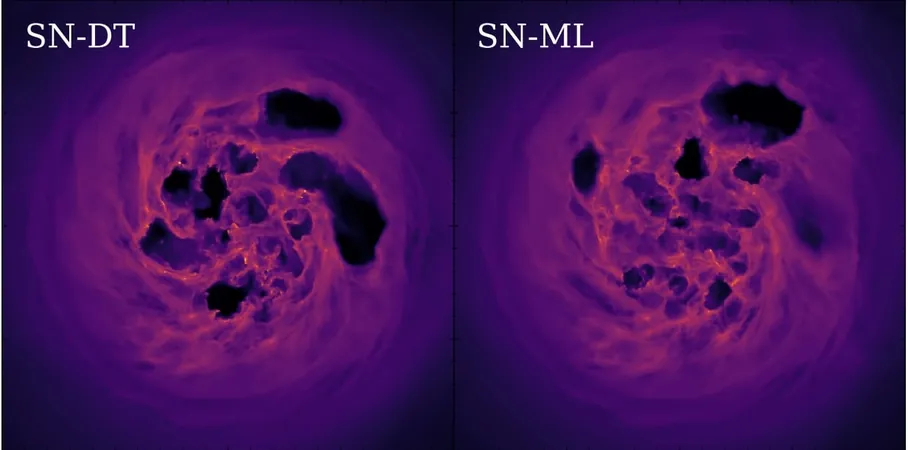
AI Outshines Supercomputers in Simulating the Universe's Evolution!
2025-07-03
Author: Li
A Revolutionary Leap in Cosmic Simulations!
At the cutting-edge RIKEN Center for Interdisciplinary Theoretical and Mathematical Sciences in Japan, researchers are embarking on a groundbreaking journey that could alter our understanding of the cosmos. An international team, spearheaded by Postdoctoral Researcher Keiya Hirashima, has discovered that machine learning can significantly enhance galaxy evolution simulations, outpacing traditional supercomputer capabilities!
AI Takes the Lead in Galaxy Formation!
In a thrilling face-off, AI has triumphed in simulating galaxy formation—an area fraught with challenges, especially the intricate role of supernovae. With opportunities to examine these explosive events scarce, scientists typically rely on complex numerical simulations, which require colossal computational power and time. However, the new approach could illuminate the formation of our Milky Way and the elemental building blocks of life!
Breaking Down the Simulation Challenge!
The process of simulating supernovae is notoriously complicated, as these dramatic events transpire on timescales nearly a thousand times shorter than what traditional supercomputers can model. The team leveraged AI within their ASURA code, combining advanced N-body methods with Smoothed Particle Hydrodynamics, to tackle this temporal limitation. By integrating cutting-edge technology from Preferred Networks, they developed a novel framework that drastically improves efficiency.
Introducing the ASURA-FBPS-ML Model!
The ASURA-FBPS-ML model emerged from this collaboration, allowing researchers to replicate the dynamics of a previously simulated dwarf galaxy in only one quarter of the computation time! Hirashima proudly stated, "Using our AI model, simulations run about four times faster than standard methods, slashing computation time from several months down to just weeks!"
Training the AI: A Cosmic Experiment!
To empower their AI, the researchers trained it on data from a staggering 300 simulations of a supernova within a molecular cloud, equivalent to a million times the mass of our Sun. This meticulous training enables the AI to predict critical factors such as density, temperature, and 3D velocities of gas particles during supernova shell expansion over hundreds of thousands of years.
Unlocking the Secrets of the Universe!
This innovative approach opens spectacular possibilities for future cosmic explorations. With aspirations of creating high-resolution models simulating the Milky Way and potentially shedding light on the origins of the Solar System, Hirashima remarked, "Our AI-assisted framework allows us to predict not only how galaxies evolve but also the vital elements that might spark life!"
The Future of Universe Simulation!
Currently, the RIKEN lab is utilizing their groundbreaking ASURA-FBPS-ML model to conduct simulations of galaxies as large as the Milky Way, paving the way for new theories about life and the cosmos. Their findings, highlighted in The Astrophysical Journal, mark just the beginning of what could be an extraordinary journey into the heart of our universe.


 Brasil (PT)
Brasil (PT)
 Canada (EN)
Canada (EN)
 Chile (ES)
Chile (ES)
 Česko (CS)
Česko (CS)
 대한민국 (KO)
대한민국 (KO)
 España (ES)
España (ES)
 France (FR)
France (FR)
 Hong Kong (EN)
Hong Kong (EN)
 Italia (IT)
Italia (IT)
 日本 (JA)
日本 (JA)
 Magyarország (HU)
Magyarország (HU)
 Norge (NO)
Norge (NO)
 Polska (PL)
Polska (PL)
 Schweiz (DE)
Schweiz (DE)
 Singapore (EN)
Singapore (EN)
 Sverige (SV)
Sverige (SV)
 Suomi (FI)
Suomi (FI)
 Türkiye (TR)
Türkiye (TR)
 الإمارات العربية المتحدة (AR)
الإمارات العربية المتحدة (AR)